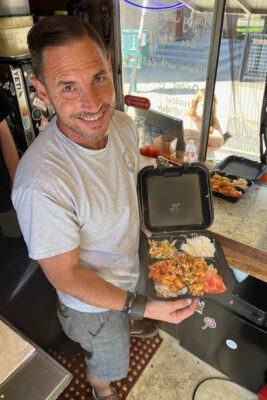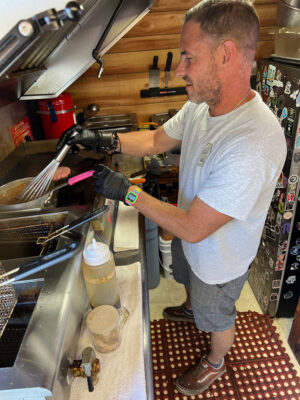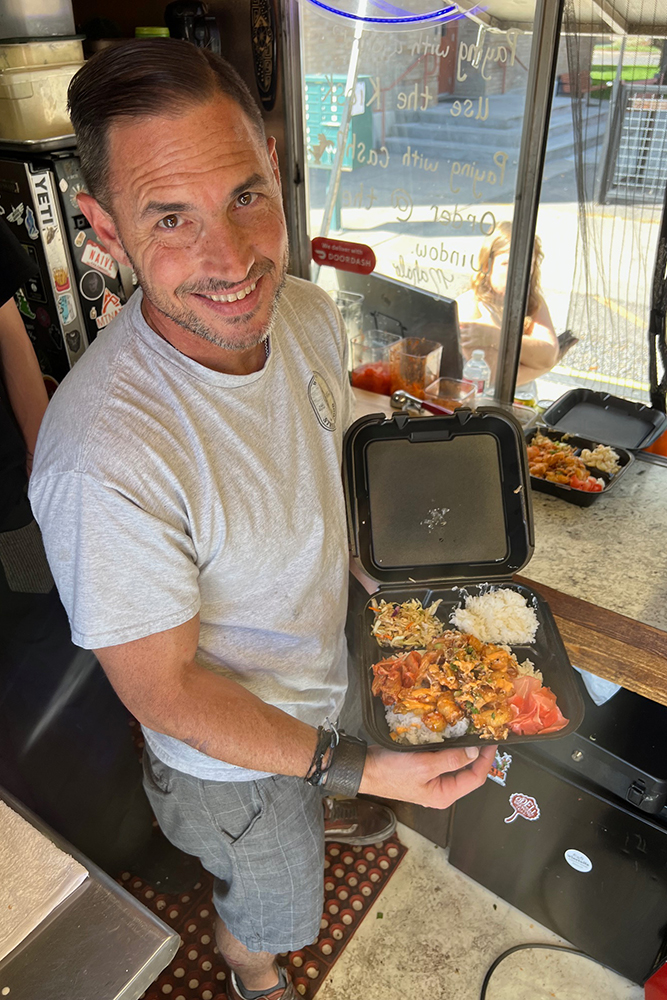Hawaii Street Food brings its trailer to GJ – to stay
Tim Harty, The Business Times
Cue Johnny Cash’s “I’ve Been Everywhere” to play in the background before you ask Dante Tripi, a chef who is French classically trained, to list the cities where he has worked in fine-dining restaurants during the past 20-25 years.
Johnny has the longer list, but Tripi’s is formidable with multiple stops in states such as Hawaii, Florida and Colorado. The latter is where he started his food trailer last year, first setting up in Breckenridge/Summit County, then Alamosa and finally this summer settling in Grand Junction.

Since the end of August, the parking lot of the The Historic Lowell School Building, 310 N. Seventh St. in downtown Grand Junction, is where his Hawaii Street Food trailer has been most days. The deviations are for occasional events or private bookings that require a brief relocation.
Tripi is active on social media, so follow Hawaii Street Food on Facebook and Instagram or go online to hawaiistreetfood.biz to see the schedule and menu.
The 44-year-old Tripi acknowledges all of his work in the food industry prior to Hawaii Street Food was in fine-dining restaurants, which begs the question: Why do a food trailer?
The answer is simple: The food he’s serving now makes him happy, and it’s hard to find around here.
“It’s food that I grew up eating and just really missed,” Tripi said. “You can’t really find it here … so I wanted to bring something that had that memory for me, that nostalgia to me.”
He figured a change might serve him and his family well, too.
“I’ve spent the last 20 years building fine-dining restaurants and from one location into multiple locations and definitely more on the intricate-plating side of things, things that take three months to make one dish, that kind of stuff,” Tripi said. “This (food trailer) just comes more from my heart, you know, and is more of what I wanted and what makes me happy.
“You know, I’ve never been unhappy eating a plate lunch from Hawaii, so it is kind of more close to home for me.
“And then I left the restaurant, brick-and-mortar style, because I wanted more time with my family, and I wanted something that was more meaningful and a direct representation of me. And so that’s kind of where this whole little food-truck thing came about.”
Tripi said he is looking to expand his menu, particularly fish options, but for now he said customers will find traditional Hawaiian food.
“It’s everything from katsu chicken, which is Japanese-style, or Korean-style short ribs to Loco Moco, which is a Hawaiian classic dish,” he said.
There’s also another name for the food and approach.
“It’s called plate lunch – is what the original name for it is – or Hawaiian barbecue,” Tripi said.
When it comes to beef, Tripi is getting it locally, as he made a point to mention Hawaii Street Food has partnered with Van Winkle Ranch to use its beef, and it gets short ribs from Quality Meat Co., 340 North Ave.
“Anywhere we can, we try to use local stuff,” he said, “and I think that helps push those items a little bit more when people find out that they can get that stuff local.”
It remains to be determined if Grand Junction customers have a preferred menu item, but Tripi said Summit County leaned toward katsu chicken, and Alamosa had an affinity for teriyaki chicken. And Spam has been popular in each place.
Tripi also is aware Grand Junction has a fair Hawaii representation via Colorado Mesa University, and he hopes Hawaii Street Food will be a go-to dining option for them.
“We hope that the community, the Hawaiian community specifically, is here trying our food and being like, ‘Oh, we should tweak this a little bit or try that a little bit.’ Or, hey, there’s their favorite dishes that they’ve come up to us and asked us for, like chicken and long rice and things like that. We take those very seriously and then want to run with those on our menu. So, it’s more of a community-like collaborative effort.”
More About Hawaii Street Food

No need to be modest
For the record, Hawaii Street Food is the trade name for No Ka ‘Oi Foods LLC. And no ka ‘oi means “the best” in Hawaiian.
How did he end up here?
Hawaii Street Food owner and chef Dante Tripi said he was born in Florida and moved to Montrose when he was 12 or 13 years old. He attended Montrose High School, but got his GED at 17, so he could leave early and go to Vermont and attend the New England Culinary Institute for two years. After graduating from NECI, Tripi headed to Hawaii to work in fine-dining restaurants in the Aloha State. Trust us when we say this is a really simplified version of events, but you get the point.
He has worked in several fine-dining restaurants in Colorado over the years, and he’s in Grand Junction now with his food trailer and plans to stay put after short stints with the trailer in Summit County and Alamosa.
“As we get going into another winter, we were kind of like, ‘OK, where are we going to home-base this thing? Where are we going to kind of set up shop? What was best for our family and all that?’” Tripi said. “Grand Junction became that place. We were lucky enough to find the place that we’re at now with the Lowell School, and that kind of put everything into place for us.
“This is home base now. This is year-round.”
Also of note, his wife, Holly Tripi (nee Pettis), is from Montrose.
“I love Colorado,” Tripi added. “I feel like the two places that I love the most in my life are Hawaii and Colorado. They are two of the most beautiful places I’ve ever been.”
Who better to learn from?
Tripi said one of the fine-dining restaurants where he worked was Roy’s in Tampa, Fla., part of a small chain of Roy’s Hawaiian-fusion restaurants that belong to Roy Yamaguchi.
That’s a big deal, as Tripi explained, “He’s mostly known as the father of Asian-fusion cuisine. Like, he’s the one who kind of brought it to the States and started it back in the ‘80s. He was my mentor for quite a while.”

